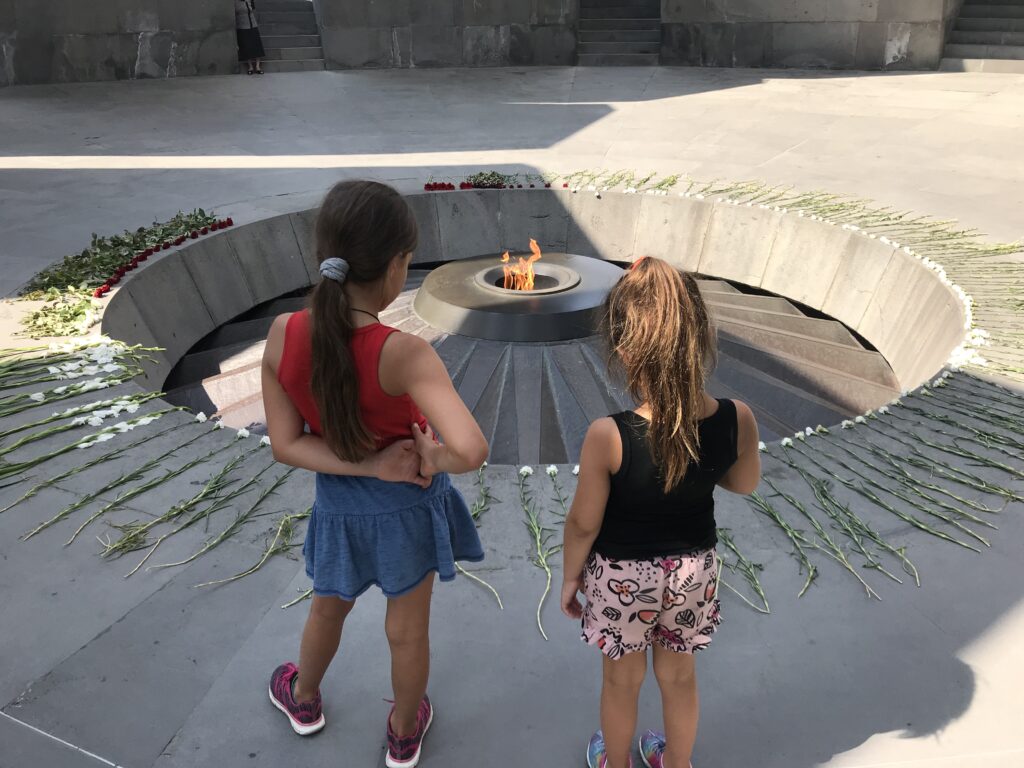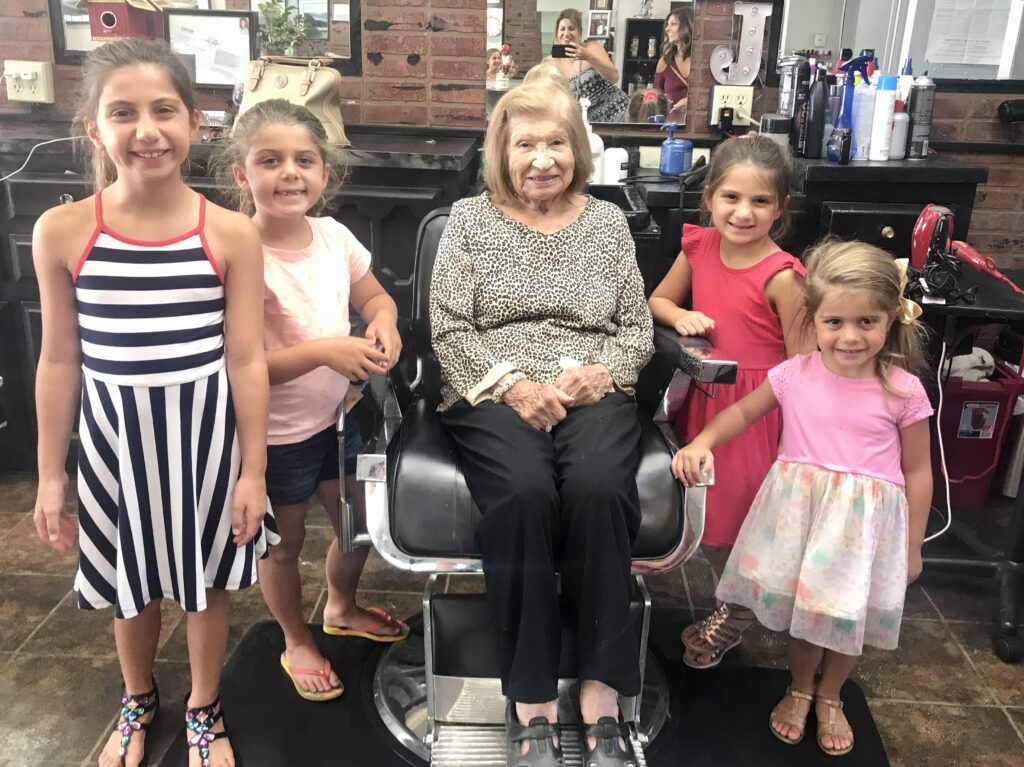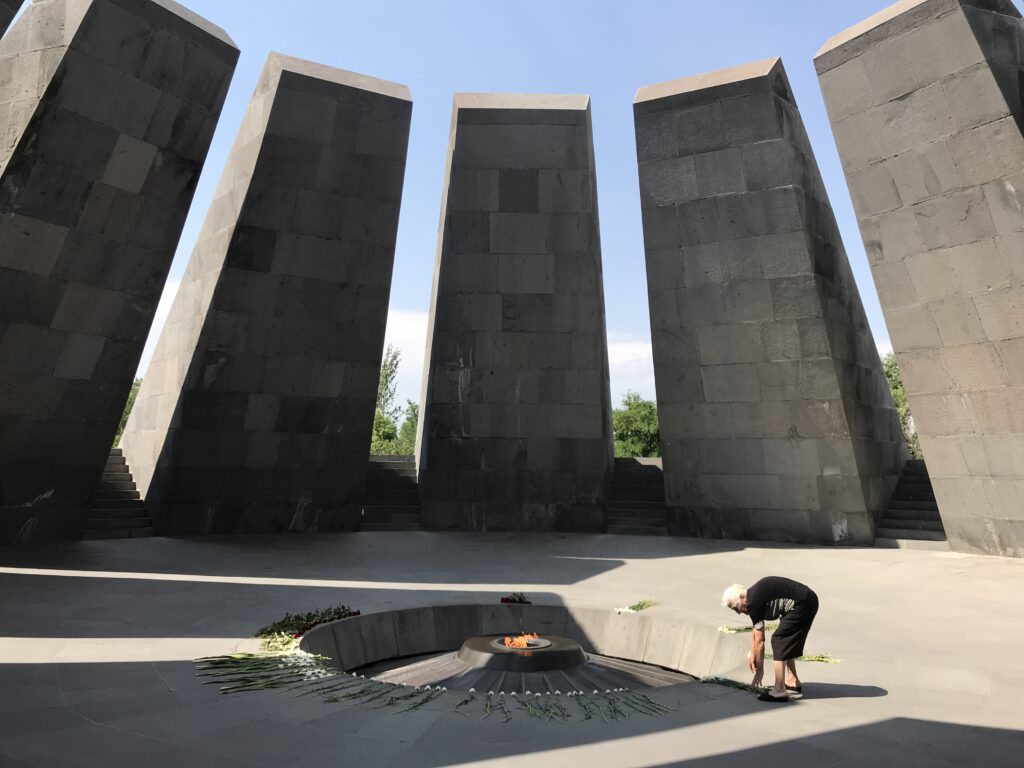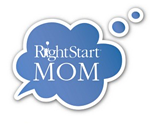Today marks 105 years recognizing (and mourning) the Armenian Genocide. A total of one and a half million men, women & children killed in Armenia during the years surrounding 1915. Every year, Armenians in every city around the world recognize this day with candlelight vigils, spiritual services, red+blue+orange flag-filled marches for justice and yell “Never Forget.” (This year’s commemorations obviously derailed and cancelled due to COVID-19.) Last June, we traveled to Armenia for the first time [with my husband’s annual plastic surgery mission] and visited the eternal flame memorial. Took my breath away. It gave me rooted perspective I never had before then and also changed me.
This morning, I did an age-appropriate mini-review with my daughters about why we commemorate April 24 every year. I told them a few generalized historical facts as well as tidbits of stories that I recently learned about my own family’s escape from this dark time…. How one of my great-grandpas arrived in Central California (via Ellis Island) with something like 13 cents in his pocket and disembarked his train only to find that his promised-sponsor failed to show up to meet him and introduce him into American life. After waiting by himself at the station for a while (looking lost and sad?) a random Armenian man who lived in the area took him under his wing, gave him a place to stay and taught him how to farm. I should also mention that (years before she made it to America) one of my great-grandmothers endured seeing her then-husband and toddler son murdered [by Ottoman Turks] right in front of her, in their home, during some kind of raid in the homeland. After this, she was allegedly sent to America to ‘marry a good man that so-and-so knew about’ to ‘start a new, safer life.’ That ‘good man’ turned out to be my great-grandfather who was lost, broke and alone at the train station. One of their future sons was my grandpa.
My girls’ faces dropped and one of them almost started crying. I myself cried as I told them the story — I always do. (I also know that my family’s story is beyond luckier than others’ stories.) And then I told my daughters: But look at how awful that was… they survived. They figured out how to work hard, how to be successful, and we are living proof how strong they were and amazing our culture is. They smiled. My little one said, “I bet they’re happy up in heaven that we’re here now and living a good life.” Then I cried a little bit more. YES, sweetheart. That’s right.
My newest catchphrase for this Day of Remembrance on April 24? Never Forget, WE SURVIVED. (Tell the kids.)

As a 3rd generation American-Armenian mom (or, some might say 4th generation — if you count all four sets of my great-grandparents who immigrated to America prior to 1915 as the first generation), I’ve been wide open about raising my girls with comfortable doses of Rose Parade grade Armenian identity and Armenian Orthodox Christian faith. Cultural identity is important to me. Always has been. Yalanchi-making included. And yes, I married an Armenian too.
My dirty secret (that so many Southern California Armenians can’t seem to get past)? I wasn’t raised with April 24 being an important day — my parents and grandparents [in Fresno, CA] never made a big deal about it. Every Sunday was Armenian Church, every holiday had some kind of Armenian food, every wedding involved Armenian dancing. But no April 24. I didn’t know what April 24 was until I was a freshman at UCLA and a friend asked me to attend a vigil with her. ?!!?!?
Before you crucify me, here’s some backstory….
All four sets of my great-grandparents came to America before 1915. Legend has it they fled to America on a hunch that major atrocities would inevitably hit their villages — Arabkir, Chomaklu, Dikranagerd, Erzurum (some of these now located in modern Turkey thanks to what happened — whether or not I’ve spelled these correctly is a perfectly valid question).
One of my grandmothers passed five years ago about two months shy of her 99th birthday. She was a 1st generation American-Armenian, born in 1916 in Los Angeles. Her family moved to California’s Central Valley when she was a toddler and lived in sheds and garages (literally) that belonged to friends before they were able to build and move into a barn on a modest property. Yes, they moved into a BARN — to LIVE. (In her notes before her passing, she wrote about how her family wallpapered the wooden walls – of the BARN – to make it a more comfortable home for her and two siblings. They later got to build a 2-room house, which still stands and is now owned by my dad and uncle.) I remember her telling us grandkids about having to go to the bathroom outside as a child and we didn’t believe her. She also told us about having chickens on their farm — which they killed, cleaned and ate — and all of us grandkids would freak out and tell her (again) that she was lying and trying to be funny. (She wasn’t. #farmlife) This lady went to college in the 1930’s (Fresno State University, with some additional/summer studies at UCLA and USC) and graduated with a teaching credential in 1938… when women weren’t really expected or allowed to do anything besides clean house. [My grandpa, her husband, built houses for a living and established himself as one of Fresno’s most popular home-builders for the Sunnyside area in Fresno, CA.]
My other grandma, who’s also a 1st generation American and now newly 100 years old is still totally with-it, capable beyond belief and timelessly adorable. She doesn’t take one smidge of medication, walks without any kind of help/equipment and (up until recent government orders) she’d get her hair done weekly at a salon. She’s lived longer than anyone I’ve ever known and has experienced everything from great success to deep tragedy. She is now one of the last living examples of our country’s Greatest Generation. After graduating high school, she moved from Sanger, CA to San Francisco to work for a bank. “I had a ball,” she’ll reminisce from time to time. “I used to get dressed up and walk payroll papers up and down Market Street… San Francisco was my town.” She still plays piano by ear — name a song and she’ll play for it you on command. She was a homemaker who drove her kids to music lessons on weekends and drove a tractor through rows of raisins on weekdays because she helped her husband [my grandpa] build a formidable farming business of grapes and raisins.

100 years (plus great-granddaughter cousins).
None of my grandparents told stories about the Genocide when my sister and cousins and I were kids. My parents never mentioned it. When I asked each grandma years later (when I was in college) why they never discussed such an important time in our heritage’s history, they both separately replied with something like, “It was such an awful thing and everyone was so ashamed… we just wanted to move forward and work hard to to be successful, to prove that Armenians were good people…”
To prove that Armenians were good people.
Or maybe they were raised by parents who were flat-out scared $hitless. They belonged to a group of people who were being hunted in their homeland… and they’d escaped. I imagine that each great-grandparent of mine was petrified of a new life in a new country whose citizens hardly welcomed them with open arms.
I’ve heard so many stories about how the first group of immigrant Armenians to California were spit on — literally. They were required to drink from alternative water fountains. They were avoided and called ugly, dirty and all kinds of things that fall under the umbrella of racism and would probably considered hate crimes in this day and age. And that Armenian language? Better not speak that in public or else (the 1950’s weren’t like today, where anyone can speak anything they want). No way were they going to start talking about some kind of Genocide that was going on… they had to figure out how to succeed at survival first.
Not only did they survive, but they managed to stay out of trouble, built businesses, got educations and showed everyone what it really means to rise up. My great-grandparents undoubtedly had everything to do with my grandparents’ collective forge-ahead-and-survive philosophy when they raised their kids [my parents].
My grandparents’ generation (and, so many other Armenian immigrant children from that time) did not allow the Armenian Genocide to define them. Don’t allow circumstances to define you. (There’s a real parenting lesson if I’ve ever heard one.) We now see how the group of Armenians who first immigrated to the U.S. (in the early 1900’s) set a gold standard of what it means to overcome the most horrifying adversity that I fear this generation has trouble tapping into.
Prior to this year, the U.S. didn’t *officially* recognize the mass killings of Armenians in the beginning of the 20th century for the genocide that it was (on account of diplomatic relations with Turkey)… until our U.S. Congress spontaneously passed resolutions that declared the acts were in fact genocide in both our House and Senate (a move that ticked off Turkey to say the least). Maybe this final push started with Kim Kardashian in that red pants suit five years ago?
It was a big win, yet many Armenians still seek MORE. Our generation wants things rectified (rightfully so). We want apologies (rightfully so). We want it on the record (rightfully so). We want reparations (rightfully so). We want it all NOW. And we will throw a fit and never ever ever let it go and punish you forever and ever amen if you don’t give us what we rightfully deserve. NOW.
I appreciate and respect our generations’ vigilance to right what was so wrong. But in this big bad world, not all wrongs have the fortune of being righted. Sometimes validation is elusive. Like I tell my kids: Sometimes we can’t always get what we want… even though it is right. (Am I right?)
The Armenian Genocide was horrific. Disgusting. Despicable. I understand and respect those who choose to still fight for it. But regardless of any recognition or reparations, WE SURVIVED. Never forget that. The world knows what happened and we’re still here, thriving beyond all rationality. (Success is the greatest revenge, they say.)
I’m raising my kids to know that others’ decisions and choices — whether they be ignorant, stupid or just plain mean and wrong — will never define who they are. No matter how high-profile or politically-driven, no one’s decisions ever define who any of us are.
The most powerful thing us Armenian moms can teach our kids is to rise above, get educated, stay motivated and positive to succeed, be contributing citizens to whatever country we happen to live in, to speak truth and protect what’s right… and have internal pride no matter who does or doesn’t recognize what happened 105 years ago.
Many say the wound is still open, but we’ve earned the credibility, respect and authority stop our own bleeding at this point. (Just because we stop our bleeding doesn’t mean the wound never happened.) Let April 24 evolve into a reminder of our own power: We can forge ahead with our past’s strength, sense of survival and success to push us forward and reinvent what it now means to have Armenian blood.
Never forget: WE SURVIVED. Our churches are everywhere. Our food is beloved. Our music and arts are still thriving. Our faith is still pulsing. And, as we pray for their souls on this day, our ancestors’s souls are smiling and rejoicing for all of us — that we’re still here. They are living through us. We survived, SO THEY SURVIVED.
NEVER FORGET. Tell your kids this. I’m telling mine.




